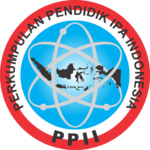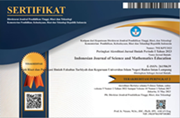Guided Inquiry Based Students’ Worksheet to Grow Students’ Critical Thinking and Communication Skills
Abstract
Weak learning process is one of the problems in education. Therefore, to create the ideal learning process, interactive teaching materials are needed to make student-centered learning.This study aims to describe and analyze teacher and student responses to the development of guided inquiry students worksheets, as well as see their effectiveness in growing critical thinking skills and student communication skills. The research method used is the Mix method with Research and Development type. The instrument used in the form of a feasibility questionnaire and tests of critical thinking skills and communication skills. Based on the research results obtained that the development of worksheets got very valid results from the validators, got very good responses from teachers and students and proven able to foster critical thinking and communication skills.
Keywords
Full Text:
PDFReferences
M. Ceberio, J. Manuel Almudi, and A. Franco, “Design and Application of Interactive Simulations in Problem-Solving in University-Level Physics Education,” J. Sci. Educ. Technol., vol. 25, no. 4, pp. 590–609, 2016.
L. Suswati, L. Yuliati, and N. Mufti, “Pengaruh Integrative Learning Terhadap Kemampuan Berpikir Kritis dan Penguasaan Konsep Fisika Siswa Lis,” J. Pendidik. sains, vol. 3, no. 2, pp. 49–57, 2015.
Mujib, “Mengembangkan Kemampuan Berfikir Kritis Melalui Metode Pembelajaran Improve,” Aljabar J. Pendidik. Mat., vol. 7, no. 2, pp. 167–180, 2016.
F. Putra, I. Y. Nur Kholifah, B. Subali, and A. Rusilowati, “5E-Learning Cycle Strategy: Increasing Conceptual Understanding and Learning Motivation,” J. Ilm. Pendidik. Fis. Al-Biruni, vol. 7, no. 2, p. 171, 2018.
B. Kamil, Y. Velina, and M. Kamelia, “Students’ Critical Thinking Skills in Islamic Schools: The Effect of Problem-Based Learning (PBL) Model,” Tadris J. Kegur. dan Ilmu Tarb., vol. 4, no. 1, pp. 77–85, 2019.
E. T. Pascarella, G. L. Martin, J. M. Hanson, T. L. Trolian, B. Gillig, and C. Blaich, “Effects of Diversity Experiences on Critical Thinking Skills Over 4 Years of College,” J. Coll. Stud. Dev., 2014.
Y. Liao, E. R. Loures, F. Deschamps, G. Brezinski, and A. Venâncio, “The Impact of the Fourth Industrial Revolution: a Cross-Country/Region Comparison,” Production, vol. 28, pp. 1–18, 2018.
R. Morrar, H. Arman, and S. Mousa, “The Fourth Industrial Revolution (Industry 4.0): A Social Innovation Perspective,” Technol. Innov. Manag. Rev., vol. 7, no. 11, pp. 12–20, 2017.
C. Anwar, A. Saregar, and Widayanti, “The Effectiveness of Islamic Religious Education in the Universities: The Effects on the Students’ Characters in the Era of Industry 4.0,” Tadris J. Kegur. dan Ilmu Tarb., vol. 3, no. 1, pp. 77–87, 2018.
U. Hanifah, “Pentingnya Buku Ajar yang Berkualitas Pembelajaran Bahasa Arab,” J. At-Tajdid, vol. 3, no. 1, pp. 99–121, 2014.
Setyosari and H. Punaji, Metode Penelitian Pendidikan & Pengembangan. Jakarta: Penada Media, 2016.
P. Purnamasari, S. An’nur, and A. S. M., “Pengembangan Bahan Ajar melalui Model Pembelajaran REACT pada Materi Elastisitas,” Berk. Ilm. Pendidik. Fis., vol. 4, no. 3, pp. 209–221, 2016.
A. Hidayat, A. Suyatna, and W. Suana, “Pengembangan Buku Elektronik Interaktif pada Materi Fisika Kuantum Kelas XII SMA,” J. Pendidik. Fis. Univ. Muhammadiyah Metro, vol. 5, no. 2, pp. 87–101, 2017.
Nurmayanti, I. Rosilawati, and N. Fadiawati, “Pengembangan E-Book Interaktif Berbasis Representasi Kimia pada Materi Ikatan Kimia,” J. Pendidik. dan Pembelajaran Kim., vol. 6, no. 1, pp. 160–172, 2017.
F. R. Jauhariyah, H. Suwono, and I. Ibrohim, “Science, Technology, Engineering and Mathematics Project Based Learning (STEM-PjBL) pada Pembelajaran Sains,” in Pros. Seminar Pend. IPA Pascasarjana UM, 2017, vol. 2, pp. 432–436.
A. Permanasari, “STEM Education: Inovasi dalam Pembelajaran Sains,” Pros. Semin. Nas. Pendidik. Sains, pp. 2016–23, 2016.
W. Nessa, Y. Hartono, and C. Hiltrimartin, “Pengembangan Buku Siswa Materi Jarak Pada Ruang Dimensi Tiga Berbasis Science , Technology , Engineering , and Mathematics ( STEM ) Problem-Based Learning Di Kelas X,” vol. 3, no. 1, pp. 1–14, 2017.
C. Aldilla, Abdurrahman, and F. Sesunan, “Pengembangan LKPD Berbasis STEM untuk Menumbuhkan Keterampilan Berpikir Kreatif Siswa,” J. Pembelajaran Fis., vol. 5, no. 4, 2017.
J. Afriana, A. Permanasari, and A. Fitriani, “Penerapan Project Based Learning Terintegrasi STEM untuk Meningkatkan Literasi Sains Siswa Ditinjau dari Gender Implementation Project-Based Learning Integrated STEM to Improve Scientific Literacy Based on Gender,” J. Inov. Pendidik. IPA, vol. 2, no. 2, pp. 202–212, 2016.
DOI: http://dx.doi.org/10.24042/ijsme.v3i1.5146
Refbacks
- There are currently no refbacks.
Copyright (c) 2020 Unit Riset dan Publikasi Ilmiah FTK UIN Raden Intan Lampung

This work is licensed under a Creative Commons Attribution-ShareAlike 4.0 International License.

Indonesian Journal of Science and Mathematics Education is licensed under a Creative Commons Attribution-ShareAlike 4.0 International License.




